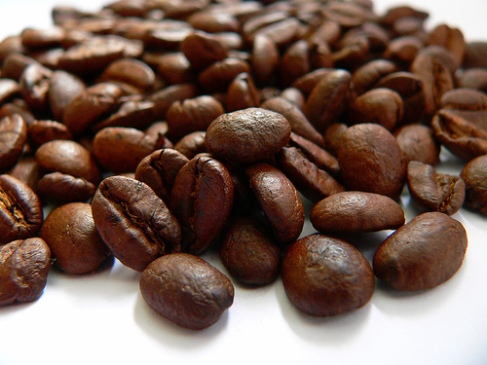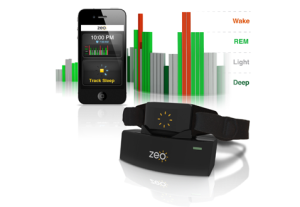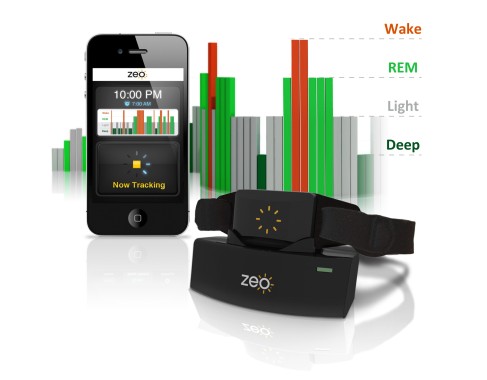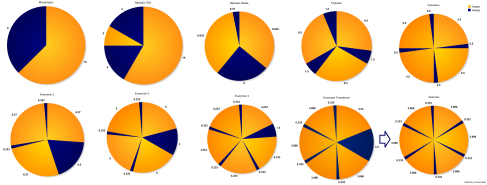Posts Tagged ‘sleep’
It’s been about a week now since I’ve started re-introducing some caffeine back into my diet due to my ideas on hacking my caffeine stimulant metabolism.
I’ve made the following changes:
– no chocolate (except in my protein shake in the AM)
– caffeine ONLY in the AM.
– broccoli and sulforaphane supplementation.
I haven’t yet tried to isolate which one of these variables is now allowing me to take in caffeine and sleep less but the results have been dramatic.
I basically went from about 9 hours of sleep with Adderall XR and 20-30mg of caffeine to about 6.5 hours of sleep with just ~20mg of caffeine.
My regular sleep WITHOUT any caffeine is just about 6.5 hours so I think I’m going to see law of diminishing returns on this path if I try to optimize further.
I’m able to sleep within 1-2 minutes of going to bed as well.
In conclusion. I’ve gone from 9 hours of sleep down to 6.5 hours of sleep with the same level of productivity. No change in wakefulness. No change in gym recovery, etc.
The real test is whether I can sustain this for six months or so.
I’m declaring a new class of applications – hostageware.
Apps that you HAVE to use because there is no valid / realistic alternative but which are SO buggy and such crap that they drive you insane.
The Zeo is the archetype.
The Zeo has a myriad of problems which seem too numerous to enumerate in one blog post.
Regardless, I’ll try to name a few.
From a platform perspective, they’ve pushed the concept of the ‘ZQ’ to explain how solid your sleep was from the night before.
However, it’s a JOKE metric.
For example, my Zeo told me I had a ZQ of 61 and that I slept 5:26 minutes.
The previous night my Zeo told me I had a ZQ of 82.
Now I’ve been controlling my sleep TIGHTLY for the last week and I can tell you that LAST NIGHTs sleep was MUCH better than the previous night.
Why? Because I was training the previous day and had a lot of recovery to catch up on. All of my subjective measures (morning, mid, and evening wakefulness and creativity) were high and my performance was exemplary.
Getting LESS sleep and more efficient sleep is a GOOD thing and not a bad thing.
It’s been YEARS since this problem was exposed. This should have been corrected in version 1.1. Have they fixed it yet?
Nope.
Another example. Last night I Slept from 12:08AM until 6:50 AM. As printed on my Zeo and recorded by me before and after I slept.
Guess how many hours the Zeo says I slept. It thinks I only slept 5:26 minutes. Major discrepancy.
I’ve asked Zeo 3-4 times for an explanation here and I keep getting conflicting answers.
The only conclusion I have is that NO ONE within Zeo actually uses their product.
One could come to the conclusion that it’s the sleep version of a lie detector (AKA snake oil) and that I’m just observing placebo effect.
However, in my experience, the deep and REM measurements are somewhat accurate and valuable to my sleep hacking.
Every time the Zeo tells me that my REM and deep numbers are off, I notice correlated mid-day sleep pressure / drowsiness (which impacts my work).
So for now I’m stuck, trapped. Zeo is keeping me a hostage.
I’d drop them in a MINUTE if there was a viable alternative.
Update: Another good example of the use of the Zeo is the ‘time to Z’ which is the amount of time it took you to all asleep. As part of my hacking I have dramatically lowered my time to Z measure. Which is great, but it’s not 1 minute which is what it suggested last night. I was definitely mellow last night but I would say it was more like 5 minutes. It’s just hard for Zeo to be very reliable with one EEG sensor but then again they shouldn’t sell their product as BEING reliable.
In the past I’ve been critical of the Zeo. I found it was an expensive toy with no REAL use in the real world.
The problem is that the previous device required you to manually upload the data EVERY NIGHT and in my mind for biohacking this type of recurring manual intervention becomes annoying VERY quickly.
The Zeo Mobile does away with this though. You just start it on your phone and off it goes.
All your data is on your smart phone and in the cloud.
The cool thing is that I can wake up the next morning and determine if I need to go back asleep or not based on how much REM and deep sleep I’ve had the night before.
In my experience if I do not train the night before I need 1 hour of deep and 2 hours of REM.
If train the day before I usually need about 1:20 of deep and 2:30 of REM. Which translate to about 9 hours of sleep.
The problem is that I CAN accidentally wake up too soon and FEEL fine in the AM … but come around 2-3 PM I can crash hard.
The new Zeo has been a real win in this regard for me and I’m sticking to it religiously now.
Check out this awesome polyphasic sleep info graphic from the guys at trypolyphasic.
After I get done this cut and get down to about 165, I am going to try to maintain my weight and bulk up for about another month and get a new baseline on my health.
Then I’m going to try polyphasic.
I think I can do the “biphasic siesta” method pretty easily. In past experiments it seems that my body NATURALLY wants to do this but I wasn’t very good at napping.
I think if I practice napping I can get better at it … but right now it takes me a long time to nap.
Also now that I have the Zeo mobile I can take it into work or just have two versions.
Having the data is valuable.
The weird thing is that sometimes when I lay down I find that the Zeo SAYS I was in REM briefly but I don’t feel like I actually slept.
The Adderall seems to cause me to become startled just as I’m about to fall asleep.
I’m going to try to phase off the Adderall as not being able to nap is causing problems and less efficiency which is counterproductive.
I did a bunch of research tonight on using oximiters and heart rate monitors for helping to diagnose sleep apnea.
I think I might have a mild sleep apnea. I was diagnosed before but the sleep lab was so pathetic that I just completely wrote off the results and never really went back.
It turns out that from what I can gather , polysomnographs are insanely expensive (like $2k per night). These are the sleep studies they run with an EEG, ECG, oximeter, etc.
Further, you can’t do one at home, and continually run sleep studies every night.
A Zeo, oximeter, and heartrate monitor could be used ot build a cheap polysomnograph. I have most of the hardware already but if you started from scratch you could build a decent one for like $750.
Not FDA approved by any means but once you’re diagnosed you can use this setup to test various sleep experiments (along with subjective quality of life measurements).
The biggest problem is that the oximeters are all targeted for active monitoring. They do no data recording.
It’s about $500 for one that does data recording and they don’t export to anything but a PC running Windows.
I’d love a way to hack something together to build a simple external data recorder.
One thing I want to play with is the ANT+ python module Kyle Machulis is writing in OpenYou …
I can use this to avoid having to first upload my data to Garmin and THEN analyze the data after the event. It will make it much easier to analyze and I could in theory even analyze the data in real time.
This would give me heart rate data as well as blood oxygen. Of course, most of the oximeters also include pulse rate so I might not need to wear a strap any more.
I really hate it when mainstream media covers lame science.
This study recently done at the University of Pennsylvania is interesting but not really helpful.
For starters. It was VERY small…. dozens of subjects:
In what was the longest sleep-restriction study of its kind, Dinges and his lead author, Hans Van Dongen, assigned dozens of subjects to three different groups for their 2003 study: some slept four hours, others six hours and others, for the lucky control group, eight hours — for two weeks in the lab.
This is the longest study of its kind? For two weeks? I’m confused.
Then there is this infographic:

What was the source of this data? Self reported? I don’t even know where to being with the flaws with self reported assessment.
Not surprisingly, those who had eight hours of sleep hardly had any attention lapses and no cognitive declines over the 14 days of the study. What was interesting was that those in the four- and six-hour groups had P.V.T. results that declined steadily with almost each passing day.
So subjects that needed 8 hours of sleep performed poorly when constrained to less hours of sleep? And we’re surprised by these findings?
And of course the NY Times doesn’t link to the actual study nor does it appear that the study is online from a Google search.
Part of the problem is that research community still doesn’t publish online.
However, when the NY Times publishes articles with such poor quality I’m not exactly encouraged to pay for articles of such low quality.
Also, why are they writing a story about a study done in 2003? That’s 8 years ago!
The biggest problem I have with this article is that the core idea of sleep optimization is to get the same quality of life with but with less sleep.
Telling people to just cold turkey start sleeping less isn’t going to have reasonable results.
You might as well tell random people to start running a marathon and then act surprised when they hurt themselves.
I have some initial conclusions from my ~2 weeks of sleep experiments.
– A pitch black room does increase my perceived sleep quality. I remember my dreams more and seem to have more dreams in general.
– The blue blocker sunglasses don’t seem to yield any meaningful result for me. This might be because of my current level of caffeine.
– Sleeping alone doesn’t seem to impact my quality of sleep either way.
– Sleeping with the Zeo itself interrupts my sleep. A bit of a heisenbug …
– Measuring my heart rate while I sleep also interrupts my sleep. However, it yielded some interesting results. While I sleep, I can see 3-5 peaks where my heart rate will temporarily jump from 43bpm to 75bpm… I assume these coincided with REM dreaming. I can’t get my heart rate monitor and the Zeo to sync up without exporting the data and re-importing it into a new system.
Here’s a run from while I was sleeping the other night.
I can’t perform extensive analysis on this just yet as I haven’t exported all the points.

My next big change is to quit caffeine again (I’m down to only 30mg) and then try to sleep without caffeine and wake up when I feel rested. I think I can migrate to bi-phasic sleep where I have a 5-6 hour core and then a 20 minute nap in the afternoon.
Part of this is confused by my rigorous athletic training which requires sleep for recovery.
Here’s the data I have so far on tracking down my ideal sleep patterns.
– Too much caffeine is bad. Causes me to feel horrible in the morning, over sleep, etc.
– Too little caffeine is bad too. Causes me to wake up in the middle of the night with the inability to get back to sleep.

I think the reasons why are identical. My body feels lethargic when I start to go through withdraw symptoms.
If I have too much, the withdraw symptoms cause me to oversleep and feel horrible.
If I have too little, my natural sleeping patterns emerge and cause me to wake up after only 5-6 hours of sleep.
The problem is that in the past 5-6 hasn’t been enough.
It turns out that about 40mg is the right dosage so I have a digital scale and weigh my caffeine pills at 130mg every morning (they have internal buffer which needs to be accounted for).
Yet more problems emerge.
I require more sleep when I’m training (cycling, weight lifting) more often. Right now I require 8-9 hours of sleep.
So here is my next major hypothesis that I want to test.
…
Go down to ZERO caffeine.
Try to sleep 4-6 hours at night.
Sleep 30 minutes in the afternoon when the team is out to lunch.
Wear a heart rate monitor while I sleep to keep track of my resting heart rate (RHR). I think that it will show elevated RHR while my body is recovering.
In the past I’ve been able to do this… I was sleeping 5 hours at night and waking up feeling rested, but the problem is that in the afternoon I felt tired.
A nap would solve this.
So in theory my sleep would go down from 9 hours per night, to 6 hours per night.
A three hour savings – or 1.5 months extra a year of waking time. Amazing.
This is my 3rd day sleeping in an environment which is 100% pitch black with no interruptions (no sound).
My bike rides have seen a marked improvement in their subjective ride quality. I also feel a bit more rested in the afternoons.
What’s more amazing are that my dreams are now amazingly vivid!
For the last three nights I’ve had very profound dreams. These really were inspiring and I found myself thinking about them well into the afternoon.
I haven’t dreamt like this in years!
If this continues, I’m going to restart the habit of keeping a dream journal (perhaps via audio).
Additionally, my rides have been improving. My subjective ride quality on my morning 15 mile ride was about an 8 out of 10 … which is really good as lately I’ve felt I’ve been overtraining.
I hypothesize that the quality of REM is significantly improving which explains the vibrant dreams and also explains the aided recovery in my fitness.
I was able to experiment with this by not replacing my blinds but instead just taping black trash bags over the window. It’s not pretty and only temporary. I’ll buy more expensive blinds in the future but this was a cheap $20 experiment.
I also found that I wasn’t able to fully black out the whole room and there are some spots which let in some mild light in the morning. Interestingly, the last 2 days I woke up just after sunrise so I think if I make sure no light is let in EVEN during sunrise then I can further optimize my sleep experience.
So far this has been full of WIN. Very excited to see what happens over the next few weeks.
My initial goals were to sleep less total hours but I’ll settle for this as it will also have a significant impact on my quality of life.
Another quick thought. The Zeo has turned out to be of no help. My ZQ scores are the same if not lower. On Sunday night I woke up 5 times. The Zeo says I only woke up once. My current thinking about the Zeo is that it’s an expensive pseudoscientific toy… Even gradual wake up function hasn’t helped me.
One of my big goals has been to try to get my sleep down to 5 hours of sleep per night.
A few years ago I was able to hit a zen mode for about 1 month where I was only sleeping 5 hours per night.
I’ve since been trying to duplicate that.
The theory is that if I can REM more efficiently, and I’m not disturbed during my sleep, then I can compact my sleep into a smaller time range.
The impact on my life could immense with a significant amount of time added to my life per day/week/month/year.
Adding 1-2 hours a night is like is like 2-4 weeks of extra waking hours per year!

So inspired by this post at the Quantified Self Boston meetup, I’ve decided to go heads down on another iteration of sleep optimization.
One of the things I’m struggling with is that due to my athletic training, sleep is required for repair of muscle tissue.
It’s hard to argue for shaving an hour off as my body just flat out needs the sleep (vs someone with a sedentary lifestyle).
I still think that I can shave some time off though.
Step 1, no interruptions
One of the major optimizations that I’m trying to make is reducing the number of trips to the bathroom at night by reducing water intake after 7pm.
So far I haven’t had much luck. I think I need at least 3-4 hours of no water intake before I go to sleep to allow me to sleep through the night without any interruptions.
The iPhone is now off for all alerts. The only thing that can interrupt me is work with a special reserved emergency phone number.
The cats are also downstairs in their room (which is now really nice and comfortable so I don’t feel guilty about keeping them there).
Step 2, NO light in the bedroom.
I made this change last night by blocking out all the light from my misc devices.
I also taped black trash bags to the windows to block out all light.
Long term (after a week) I plan on replacing the blinds with ones that block out all light if this turns out to be a major optimization.
This was my first night running with these changes.
So far the results have been really interesting.
My dreams last night were VERY vivid. I had a long dream about traveling to China, and losing my wallet. I also remember my dreams which is rare for me.
In my dream I took a flight to Singapore but they purchased my ticket wrong and somehow I ended up on a circular flight BACK to Singapore which took 34 hours. In my dream I slept the whole flight (I N C E P T I O N) and then woke at the remote end BACK in Singapore really pissed off and demanded a refund! (ha).
I also had a dream that I was fighting a war with monsters that had invaded earth. Some other alien civilization came and was providing us weapons to fight them. Yeah, I’m a scifi nerd.
Right after waking up I felt , ok… Felt very rested. It’s 1pm and I feel a bit lethargic though. I slept 8 hours so this might be an overtraining as I need to take my day off from training soon. I might listen to my body and just take a nap anyway.
Step 3, No blue light before I sleep
I’ve understood that this has been a problem with my body for some time. If I expose myself to too much light my body produces less melatonin and I have trouble falling asleep.
Apparently, there’s a hack which was discovered circa 2001 which is to just block out blue light.
I’ve already bought these glasses and will be running an experiment tonight to see what happens.













